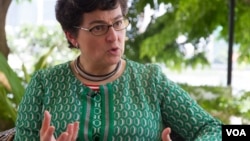[Editor’s Note: Last week, Cambodia hosted the World Economic Forum on ASEAN in Phnom Penh, gathering hundreds of senior decision-makers in trade, business, and commerce. The forum covered entrepreneurship, the ‘digital revolution’, cross-border trade, and governance for greater collaboration between industry, government and civil society. On the sidelines of the event, VOA Khmer’s Hean Socheata and Khan Sokummono spoke to Arancha Gonzalez, an executive director of the International Trade Center. This is the second part of our interview with Gonzalez.]
VOA: What do you think about the number of women obtaining top leadership positions in ASEAN?
AG: There is a lack of women in top positions. Whether in politics, in businesses, in academia, the presence of women is not in proportion to the number of women in our society. This is the case not only, by the way, here in Asia. It’s a the same across the world. If we look at the number of women prime ministers, heads of state, heads of government, and If we look at the number of women ministers, for example, ministers of trade, it’s very few. Yet, more than 50 percent of the population of the world are women. So we have to be asking ourselves the question “why?” Is it because women don’t want to be in these positions? Or is it because there are specific obstacles to limit their ability to participate and reach those positions. And I think it’s more the second than the first reason.
VOA: How and why is it important to empower women in business, trade and technology?
AG: It’s very important to empower women economically, because there is an economic reason to do that. Behind this, there is also a big economic story to tell. When we empower women economically, we obtain a triple gain. First, the countries that help their women to participate in the labor market grow more, grow faster, grow in the most solid way. For business, companies that are more diverse are more productive, have better wages, employ better. Societies that empower women economically, reduce poverty faster. Why? Because a woman, on average in the world, spends 80 percent of her income on her family or her community: in buying food, in sending their children to school, in sending the children to the doctor, in buying for the household. It’s 80 percent in the case of women and it’s only 40 percent in the case of men. This is what studies done by the World Bank and the International Monetary Fund showed.
VOA: What are the obstacles to women being involved in the economy?
AG: I think there are four main challenges. Challenge number one is that women face discrimination by law compared to men. In many countries, women could not sign a contract without their father, their husband or their brother. In many countries women cannot own assets. In many countries, women cannot open a bank account. The discrimination is written in the law. First, we need to address legal discrimination. More than 90 percent of the countries in this world still have at least one law that discriminates against women in the economy. Second, even if the law says the same, procedures are different. For example, in recent research we have done, we find that a women entrepreneur crossing borders is more likely to be asked for a bribe than a man. Third, in cases where the law and procedures are the same, for women to access credit, it’s more difficult than for men in business. Not because women are less credit-worthy. Fourth, women generally lack the networks that men have in the economy, networks in business circles.
VOA: Do you think the Cambodian government has done enough to empower young women?
AG: It’s never enough. I mean, it’s nowhere near enough. There is no country in the world that has achieved nearly full parity. So, enough is never the case.
VOA: What recommendations would you make to the government to empower their young women?
AG: I think, again, education is a very important one, making sure that girls go to school, they get educated, and they get access to the same type of education as men, and that we don’t use stereotypes. For example, if you are studying engineering, it’s for men, and if you want to study to become a teacher, that’s for women. I mean we should move away from this stereotype. Two, I think it is very important to have role models in Cambodia. Use the example of women that have made it, in economics, business, politics, or at the schools, in sports, in sciences, so that other women can see these sisters of theirs, and it’s an inspiration. We, the International Trade Center, have our own contribution to make to the empowerment to women. We have launched an initiative called SheTrades to help women in business who want to be part of international trade, which is an important means to become more productive, more competitive, and to generate better quality jobs here in Cambodia.
This interview has been edited for length and clarity.







